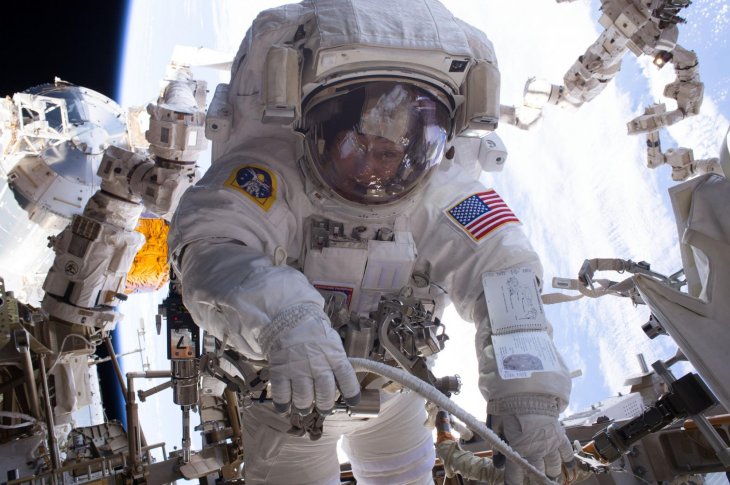Astronauts May Face Higher Risks Of Getting Cancer, Research Pointed Out
Arnav Dhar - Feb 01, 2019

New research from the University of Arizona has just proved that astronauts are more susceptible to getting cancers than normal people.
- Scientists “Teleport” Gold Nanoparticles Into Cancer Cells To Destroy Them
- Three Renowned Indian Institutes Developed A More Effective Cancer Treatment
- This Portable Device From IIT Mandi Uses AI To Detect Cervical Cancer More Accurately
Space environment can be dangerous, yet it just proved to be able to increase the risk of getting cancer.
8 blood samples of space explorers who went through at least half a year on the ISS were tested by scientists of the University of Arizona. They found out that astronauts' defense against certain diseases such as leukemia may be reduced by space travel.
The research was published in the Journal of Applied Physiology and funded by NASA. In this research, they figured that the capability of white blood cells in charge of fending off basic infections and disease cells — a.k.a NK (natural killer) cells — was strongly reduced in astronauts. In particular, after just 90 days of space traveling, the space explorers' ability to ward off leukemia was diminished by 50%.

Past researches have found that there were correlations between the risk of getting cancer and space travel in the long term. However, this is the first time they discovered that the risks exist during, not just after long space travel.
Richard Simpson, head of the research, revealed that NASA, as well as other space agencies, is concerned with the risk of astronauts' immune system being impaired. He also explained that the primary cause of the increased cancer risk is radiation exposure.
However, Simpson also said the group at the moment couldn't seem to demonstrate a direct connection between the reduction in NK-cells' abilities and the space explorers' vulnerability to cancer. There were other causes that could trigger this including microgravity, radiation, and stress.
Exercise and special nutrition have proved to enhance the immune system on Earth, so Simpson and his group hoped the same could happen in microgravity.
In any case, the finding is a critical initial move toward knowing what's making the immune system reduce amid space travel. Only after that will we discover an answer — and in the long run an approach to remain healthy on long voyages to other planets.
Featured Stories

Features - Jan 29, 2026
Permanently Deleting Your Instagram Account: A Complete Step-by-Step Tutorial

Features - Jul 01, 2025
What Are The Fastest Passenger Vehicles Ever Created?

Features - Jun 25, 2025
Japan Hydrogen Breakthrough: Scientists Crack the Clean Energy Code with...

ICT News - Jun 25, 2025
AI Intimidation Tactics: CEOs Turn Flawed Technology Into Employee Fear Machine

Review - Jun 25, 2025
Windows 11 Problems: Is Microsoft's "Best" OS Actually Getting Worse?

Features - Jun 22, 2025
Telegram Founder Pavel Durov Plans to Split $14 Billion Fortune Among 106 Children

ICT News - Jun 22, 2025
Neuralink Telepathy Chip Enables Quadriplegic Rob Greiner to Control Games with...

Features - Jun 21, 2025
This Over $100 Bottle Has Nothing But Fresh Air Inside

Features - Jun 18, 2025
Best Mobile VPN Apps for Gaming 2025: Complete Guide

Features - Jun 18, 2025
A Math Formula Tells Us How Long Everything Will Live
Read more

Mobile- Feb 17, 2026
Anticipating the Samsung Galaxy S26 and S26+: Key Rumors and Specs
The Samsung Galaxy S26 series is on the horizon, sparking excitement among tech enthusiasts.

ICT News- Feb 19, 2026
Escalating Costs for NVIDIA RTX 50 Series GPUs: RTX 5090 Tops $5,000, RTX 5060 Ti Closes in on RTX 5070 Pricing
As the RTX 50 series continues to push boundaries in gaming and AI, these price trends raise questions about accessibility for average gamers.

ICT News- Feb 18, 2026
Google's Project Toscana: Elevating Pixel Face Unlock to Rival Apple's Face ID
As the smartphone landscape evolves, Google's push toward superior face unlock technology underscores its ambition to close the gap with Apple in user security and convenience.
Comments
Sort by Newest | Popular